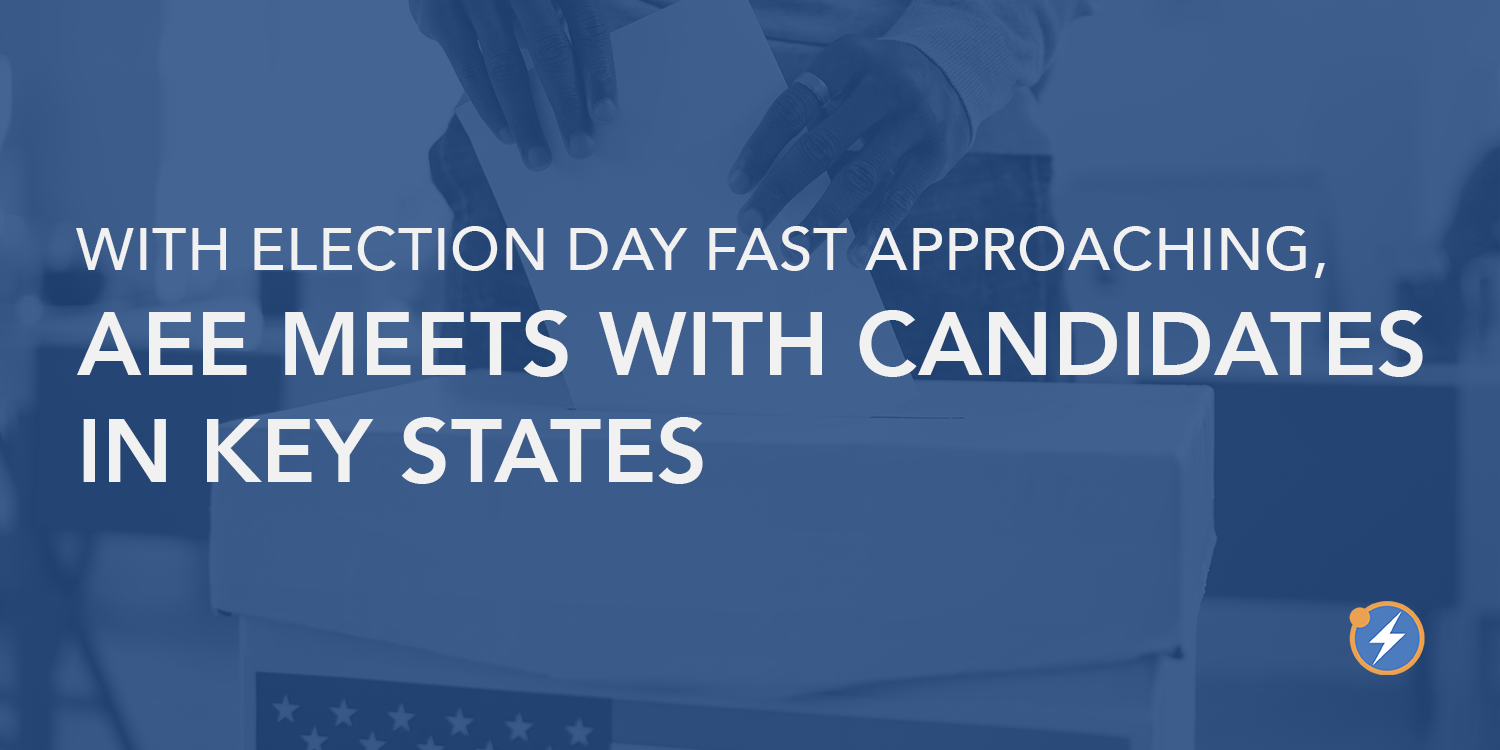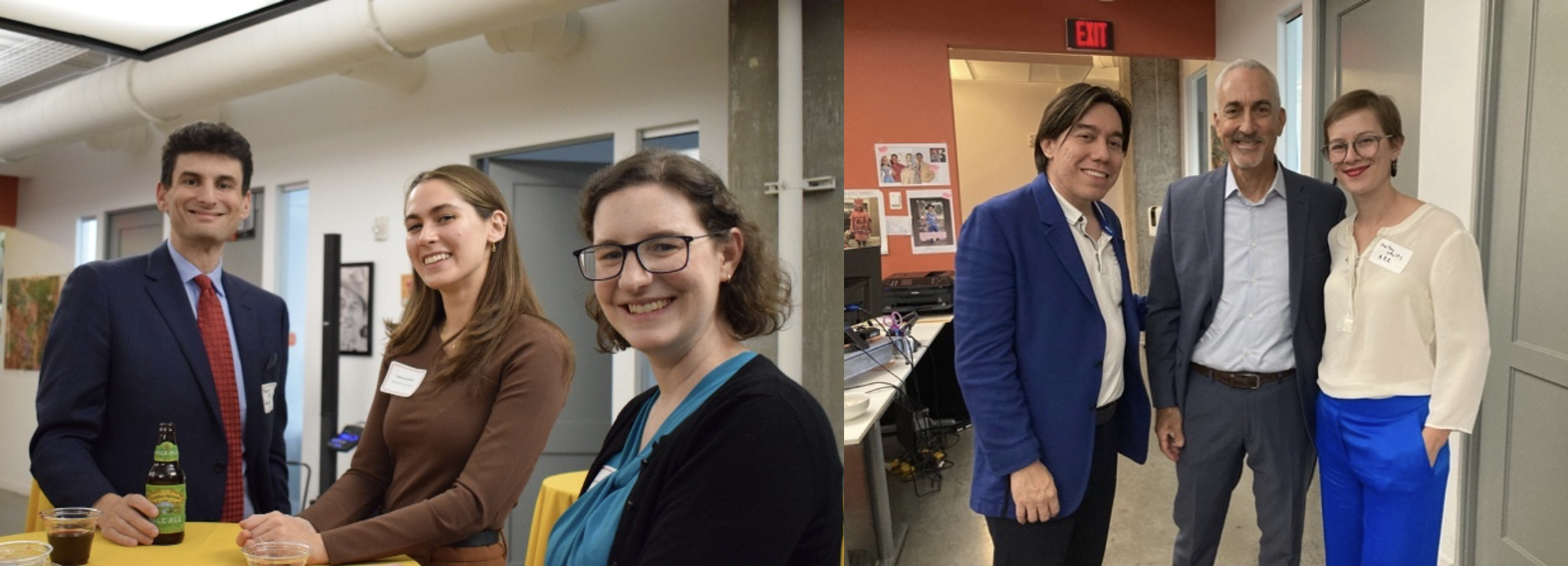
While much attention is focused on key Congressional races as we head into Election Day, the outcomes of contests for governor and state legislative seats could be just as consequential for the clean energy industry—if not more so. To ensure state policies help advanced energy and transportation make the necessary strides needed for the U.S. to reach net zero, AEE met with more than 130 candidates in key races to emphasize the value of clean energy.
At each meeting, AEE member companies introduced candidates to their in-state work and connected the dots on how state policy impacts their company’s ability to bring jobs and economic growth to nearby communities. The long list of AEE member companies that participated in the meetings (thank you!) included Enel, SunPower, Mainspring, Utilidata, Bp Pulse Fleets, Pattern, Enchanted Rock, Highland, Cypress Creek Renewables, Shell Recharge, Rivian, Engie, Apex, Key Capture Energy, Nuvve, DNV, NRG and others. The meetings, which included conversations with gubernatorial campaigns, candidates for legislative leadership positions, candidates likely to inherit key committee positions, and many up-and-coming clean energy supporters, also offered candidates a venue to ask energy-related questions, putting them in a position to better engage with us and other decision-makers on these issues.
IN THE WEST
AEE met with over 100 legislative candidates across Arizona, California, Colorado, New Mexico, Nevada, and Texas, with notable meetings including Arizona State Senator TJ Shope, California Assembly Energy Committee Chair Eduardo Garcia, Colorado Representative Perry Will, New Mexico Representative Linda Serrato, campaign staff for Nevada Governor Steve Sisolak, and Texas Representative Terry Canales.

Candidates and member companies at our Mixer hosted by Rose Law Group in Arizona this September. Photos courtesy of Madelaine Braggs and Leah Rubin Shen.
The program provided candidates across key western states with insights into the industry, information on economic opportunities for advanced energy, and details on persistent roadblocks that stifle clean energy development. Key topics included:
- A regional transmission organization in the west: Coordinated energy sharing will help balance clean energy resources across the region and prevent system-wide power disruptions, all while reducing energy costs for ratepayers. Our sessions detailed the momentum and the value of building for this type of interconnected power grid as states like Colorado and Nevada take steps to join a regional market by 2030.
- Distributed energy resources (DERs) and demand side management (DSM): Candidates meetings in the west outlined the value of DERs, like as rooftop solar and home energy storage, and emphasized how these resources can provide long-term economic relief to customers by lowering monthly energy bills and allowing utilities to avoid expensive system upgrades. Conversations also touched on how DSM can similarly lower consumer energy burden via energy efficiency, time-varying rates, and demand response programs that offer favorable rates in exchange for more flexible energy use.
- EV infrastructure: Our meetings covered the basics of EV charging and how to leverage this growing industry to create new economic opportunities, particularly as the growing demand for EVs necessitates reliable and resilient charging infrastructure. Discussions around charging infrastructure all touched on working to make sure that access to charging is not a barrier for those who want to drive electric.
- Planning for the future of natural gas in buildings: The building sector is undergoing a significant transition driven by consumer preferences, state policy goals, new federal action, high gas prices, and the rapidly falling costs of advanced energy technologies. Candidates and members discussed the need for sound long-term planning to increase cost transparency and prevent non-critical spending on a gas distribution system that is likely to see fundamental changes in the coming years.
Beyond sharing our insights into clean energy technologies and the policies needed to spur continued development, these meetings also proved to be a great opportunity to learn about their priorities and the concerns posed by their constituents. Common themes across the west included:
- A just and equitable transition: While the exact meaning of “just transition” may be different to individual lawmakers and their communities, many candidates had equity issues top of mind. For some, it meant ensuring coal communities in their districts have jobs and revenue in the future. For others, it meant distributing the benefits of advanced energy equitably so that no one gets left behind.
- Concern about natural disasters: Natural disasters have brought power system reliability and resiliency to the forefront. Many candidates and their voters came to care about advanced energy issues via concerns surrounding emergencies like water shortages, wildfires, extreme heat, and blackouts.
- Cost: Unsurprisingly, the rising cost of gasoline, natural gas, and electric bills brought home the urgent need to transition our energy system away from price volatile commodities. Candidates at our sessions explored how advanced energy technologies can help customers lower their electric bills now and into the future.
- EVs and the power grid: While many candidates expressed familiarity with challenges facing increased load on the grid from EVs, they were eager to learn about opportunities to utilize EVs—and their batteries—as an asset to the grid.
- Federal funds: With the passage of the Inflation Reduction Act and Infrastructure Investment and Jobs Act, candidates were eager to understand how the implementation of these laws can benefit their constituents and what they can do to make the most of incoming funds.
- Hydrogen and lithium: These resources were hot topics in several meetings. Our discussions included an introduction to the best applications for hydrogen and an overview of this historic moment for critical minerals.
IN THE EAST
AEE met with 30 candidates across Michigan, Illinois, Indiana, New York, Pennsylvania, and Florida, with more meetings planned as we approach November 8. Notable meetings thus far included the policy campaign staff for Pennsylvania Attorney General Josh Shapiro, candidate for Governor in PA; Illinois State Senator David Koehler, who also co-chairs the National Conference of State Legislators’ Task Force on Energy Supply; and Indiana House Speaker Todd Huston.

Candidates and member companies at our sessions in Indiana. Photos courtesy of Caryl Auslander.
The political and energy landscapes vary significantly from state to state and region to region, and that was reflected in the conversations. In states like Illinois and New York where far-reaching climate and clean energy legislation was recently enacted, conversations with candidates were more likely to revolve around implementation of existing laws, compared to states like Pennsylvania or Indiana that lack similar proactive policies.
At the same time, there were common issues and opportunities discussed in our candidate education meetings across key eastern and central states:
- Deploying renewables: While states like Illinois and New York have far more aggressive renewable energy targets than states like Indiana, there were discussions with candidates in each around how to overcome challenges regarding siting renewables and connecting them to the power grid. These were especially eye-opening discussions for candidates who previously fought hard to pass bold renewable energy targets, as member companies stressed that chances are slim that such targets will be met without new uniform siting legislation.
- The transition to EVs: Many candidates we spoke with are working to increase their understanding of transportation electrification, as well as the policies that can best support this transition in their states. Our conversations covered the need for expanded charging infrastructure and the steps to get there, how clean car and zero emission vehicle standards help to promote EV deployment, state and corporate fleet electrification, the need to lift limits on the direct sales of EVs, and the basics of EV technology and the EV user experience.
- Understanding IRA & IIJA and their impacts: While most candidates were aware of these historic initiatives, there were a slew of questions regarding what state-level implementation of these programs will look like, as well as the role of existing and proposed state-level energy initiatives in the new post-IRA/IIJA landscape.
Many thanks to the AEE member companies who participated in these candidate education meetings. Member involvement and expertise is critical to making this outreach effort a success, and to ensuring that the policies debated in 2023 legislative sessions work for both individual states and the clean energy industry. To learn more about these key races, and the impacts they could have on the advanced energy industry, join our top state policy experts next Tuesday, October 25 in a webinar discussion for the political lay of the land.